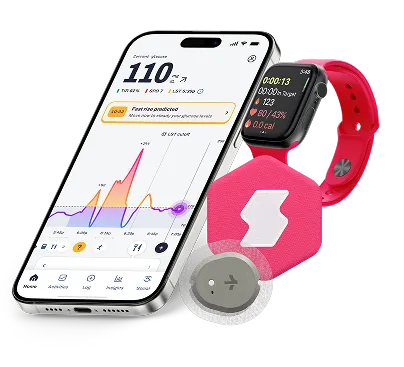Watermelon, often hailed for its refreshing and hydrating properties, is a summer favorite for many. Despite its relatively high carbohydrate content, watermelon has a surprisingly low glycemic index, making it a favorable choice for individuals concerned about blood sugar management. Rich in nutrients such as vitamins A, C, and B6 and the antioxidant lycopene, watermelon can offer a range of health benefits beyond its sweetness.
A standard serving of 100 grams of watermelon contains only 7.55 grams of carbohydrates and 30 calories, making it a guilt-free indulgence for those mindful of their blood sugar levels.¹ This article aims to provide an in-depth understanding of the impact of watermelon on blood sugar levels and its potential role in a diabetic-friendly diet, shedding light on its lesser-known nutritional advantages.
Sign up to be the first to know about special offers and exciting Signos news.
Glycemic Index Table
A standard serving of 100 grams of watermelon contains 7.55 grams of carbohydrates.¹ To calculate the Glycemic Load (GL) per serving, we can utilize the formula: Glycemic Load = (Glycemic Index * Net Carbs per Serving) / 100. Additionally, the glycemic index of watermelon is estimated to be 72, which falls into the category of high glycemic index foods.² The glycemic index of a food refers to how quickly that food causes blood sugar levels to rise.
Watermelon, despite having a high glycemic index, is often considered acceptable for individuals with diabetes because it contains a relatively low amount of digestible carbohydrates per serving, which contributes to a lower glycemic load. Notably, cooking typically does not affect the glycemic index of watermelon significantly, as it is commonly consumed fresh and raw.

Nutritional Facts
Watermelon is a hydrating fruit that is notably low in calories, containing about 30 calories per 100-gram serving.¹ It is also a rich source of vitamins A and C, contributing to healthy skin and a robust immune system. Furthermore, it contains a significant amount of the antioxidant lycopene, associated with potential benefits for heart health.
The nutritional information below is for 100 g of watermelon.¹
Nutritional Facts

Is Watermelon Good for Weight Loss?
Watermelon can be beneficial to a weight loss diet due to its high water content and low calorie density. With only about 30 calories per 100-gram serving, watermelon can help promote satiety and prevent overeating, as suggested by the Harvard T.H. Chan School of Public Health.
Furthermore, its natural sweetness can satisfy cravings for sugary snacks, potentially aiding in reducing overall calorie intake. However, it's essential to consume watermelon in moderation as part of a balanced diet that includes a variety of nutrient-dense foods to ensure adequate intake of essential vitamins, minerals, and fiber for overall health and well-being.
Is Watermelon Safe for People Living with Diabetes?
Watermelon, despite its relatively high natural sugar content, can be included in the diet of individuals with diabetes in moderate portions, as it has a low glycemic index and glycemic load. The American Diabetes Association suggests that individuals with diabetes can enjoy watermelon as part of a balanced meal plan, considering its low calorie and carbohydrate content per serving.
However, portion control is vital to prevent any significant spikes in blood sugar levels. Additionally, it is advisable for individuals with diabetes to consume watermelon as part of a well-rounded diet that includes a variety of fruits, vegetables, whole grains, and lean proteins, as recommended by the Centers for Disease Control and Prevention.
Better health starts here.
Sign up for tips and insights that work for you!
Allergies
Allergies to watermelon are relatively uncommon but can manifest as oral allergy syndrome in individuals with existing pollen allergies. This syndrome is typically characterized by itching or swelling of the lips, mouth, and throat after consuming certain fruits and vegetables, including watermelon. It is crucial for individuals with known pollen allergies to be aware of this potential cross-reactivity to prevent allergic reactions. Additionally, some cases of watermelon allergy have been reported to be associated with latex allergies, as both watermelon and latex share similar allergenic proteins.

References
References
- USDA FoodData Central. (2019, April 1). Food Details - Watermelon, raw. https://fdc.nal.usda.gov/fdc-app.html#/food-details/167765/nutrients
- The University of Sydney. (2023, May 1). Glycemic Index – Glycemic Index Research and GI News. https://glycemicindex.com/




.svg)
.svg)
.svg)
.svg)
.svg)
.svg)
.svg)
.svg)
